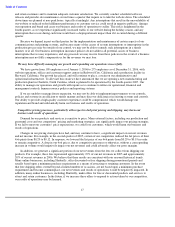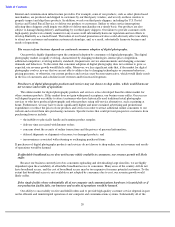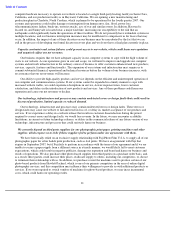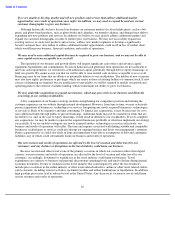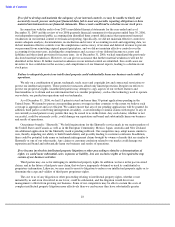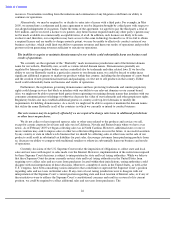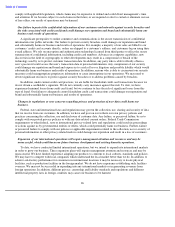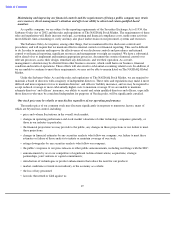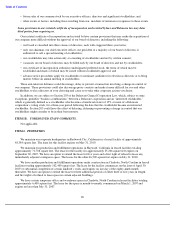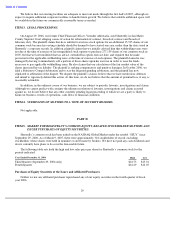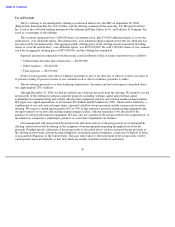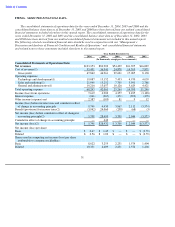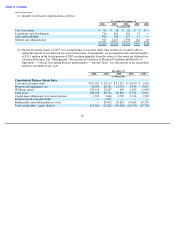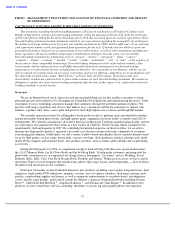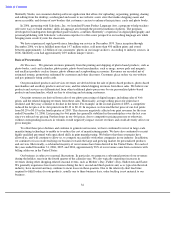Shutterfly 2007 Annual Report Download - page 29
Download and view the complete annual report
Please find page 29 of the 2007 Shutterfly annual report below. You can navigate through the pages in the report by either clicking on the pages listed below, or by using the keyword search tool below to find specific information within the annual report.
Table of Contents
resources. Uncertainties resulting from the initiation and continuation of any litigation could limit our ability to
continue our operations.
Alternatively, we may be required to, or decide to, enter into a license with a third party. For example, in May
2005, we entered into a settlement and license agreement to resolve litigation brought by a third party with respect to
our alleged infringement of its patents. Under the terms of the agreement, we agreed to pay the third party a total of
$2.0 million, and we received a license to its patents. Any future license required under any other party’
s patents may
not be made available on commercially acceptable terms, if at all. In addition, such licenses are likely to be non-
exclusive and, therefore, our competitors may have access to the same technology licensed to us. If we fail to obtain
a required license and are unable to design around a patent, we may be unable to effectively conduct certain of our
business activities, which could limit our ability to generate revenues and harm our results of operations and possibly
prevent us from generating revenues sufficient to sustain our operations.
The inability to acquire or maintain domain names for our website could substantially harm our business and
results of operations.
We currently are the registrant of the “Shutterfly” mark in numerous jurisdictions and of the Internet domain
name for our website, Shutterfly.com, as well as various related domain names. Domain names generally are
regulated by Internet regulatory bodies and are controlled also by trademark and other related laws. If we lose the
ability to use our Shutterfly mark in a particular country or our domain name, we could be forced to either incur
significant additional expenses to market our products within that country, including the development of a new brand
and the creation of new promotional materials and packaging, or elect not to sell products in that country. Either
result could substantially harm our business and results of operations.
Furthermore, the regulations governing domain names and laws protecting trademarks and similar proprietary
rights could change in ways that block or interfere with our ability to use relevant domains or our current brand.
Also, we might not be able to prevent third parties from registering or retaining domain names that interfere with our
consumer communications or infringe or otherwise decrease the value of our trademarks and other proprietary rights.
Regulatory bodies also may establish additional generic or country-code top-level domains or modify the
requirements for holding domain names. As a result, we might not be able to acquire or maintain the domain names
that utilize the name Shutterfly in all of the countries in which we currently or intend to conduct business.
Our net revenues may be negatively affected if we are required to charge sales taxes in additional jurisdictions
or other taxes on purchases.
We do not collect or have imposed upon us sales or other taxes related to the products and services we sell,
except for certain corporate level taxes and sales tax in California, Nevada and Pennsylvania where we have a tax
nexus. As of February 2007 we began collecting sales tax in North Carolina. However, additional states or one or
more countries may seek to impose sales or other tax collection obligations on us in the future. A successful assertion
by any country or state in which we do business that we should be collecting sales or other taxes on the sale of our
products could result in substantial tax liabilities for past sales, discourage customers from purchasing products from
us, decrease our ability to compete with traditional retailers or otherwise substantially harm our business and results
of operations.
Currently, decisions of the U.S. Supreme Court restrict the imposition of obligations to collect state and local
sales and use taxes with respect to sales made over the Internet. However, implementation of the restrictions imposed
by these Supreme Court decisions is subject to interpretation by state and local taxing authorities. While we believe
that these Supreme Court decisions currently restrict state and local taxing authorities in the United States from
requiring us to collect sales and use taxes from purchasers located within their jurisdictions, taxing authorities could
disagree with our interpretation of these decisions. Moreover, a number of states in the United States, as well as the
U.S. Congress, have been considering various initiatives that could limit or supersede the Supreme Court’s position
regarding sales and use taxes on Internet sales. If any state or local taxing jurisdiction were to disagree with our
interpretation of the Supreme Court’s current position regarding state and local taxation of Internet sales, or if any of
these initiatives were to address the Supreme Court’s constitutional concerns and result in a reversal of its current
position, we could be required to collect additional sales and use taxes from purchasers. The
24





